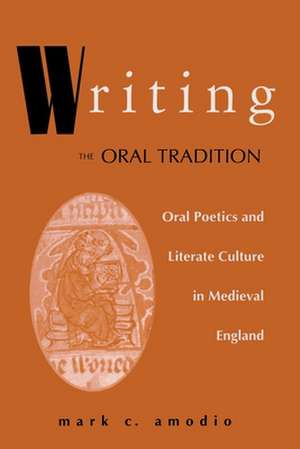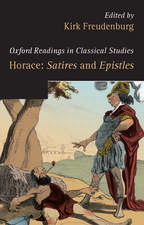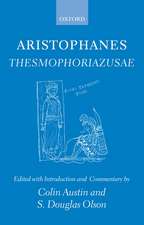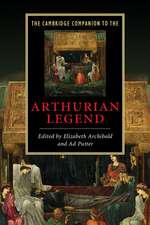Writing the Oral Tradition – Oral Poetics and Literate Culture in Medieval England: Poetics of Orality and Literacy
Autor Mark C. Amodioen Limba Engleză Paperback – 29 noi 2004
"This is a splendid, rewarding book destined to reshape critical thinking about medieval poetry in English. Amodio combines groundbreaking theory with a deep, wide-ranging command of relevant scholarship to offer a uniquely inclusive perspective on an enormous and disparate collection of Old and Middle English poetry." —John Miles Foley, University of Missouri, Columbia
“This is a well-conceived, well-structured, and well-written book that fills a significant gap in current scholarly discourse. Amodio is extremely well-informed about current oral theory, and presents a beautifully integrated thesis. This clear-sighted and provocative book both promises and delivers much.” —Andy Orchard, University of Toronto
Mark Amodio's book focuses on the influence of the oral tradition on written vernacular verse produced in England from the fifth to the fifteenth century. His primary aim is to explore how a living tradition articulated only through the public, performance voices of pre-literate singers came to find expression through the pens of private, literate authors. Amodio argues that the expressive economy of oral poetics survives in written texts because, throughout the Middle Ages, literacy and orality were interdependent, not competing, cultural forces. After delving into the background of the medieval oral-literate matrix, Writing the Oral Tradition develops a model of non-performative oral poetics that is a central, perhaps defining, component of Old English vernacular verse. Following the Norman Conquest, oral poetics lost its central position and became one of many ways to articulate poetry. Contrary to many scholars, Amodio argues that oral poetics did not disappear but survived well into the post-Conquest period. It influenced the composition of Middle English verse texts produced from the twelfth to the fourteenth century because it offered poets an affectively powerful and economical way to articulate traditional meanings. Indeed, fragments of oral poetics are discoverable in contemporary prose, poetics, and film as they continue to faithfully emit their traditional meanings.
“This is a well-conceived, well-structured, and well-written book that fills a significant gap in current scholarly discourse. Amodio is extremely well-informed about current oral theory, and presents a beautifully integrated thesis. This clear-sighted and provocative book both promises and delivers much.” —Andy Orchard, University of Toronto
Mark Amodio's book focuses on the influence of the oral tradition on written vernacular verse produced in England from the fifth to the fifteenth century. His primary aim is to explore how a living tradition articulated only through the public, performance voices of pre-literate singers came to find expression through the pens of private, literate authors. Amodio argues that the expressive economy of oral poetics survives in written texts because, throughout the Middle Ages, literacy and orality were interdependent, not competing, cultural forces. After delving into the background of the medieval oral-literate matrix, Writing the Oral Tradition develops a model of non-performative oral poetics that is a central, perhaps defining, component of Old English vernacular verse. Following the Norman Conquest, oral poetics lost its central position and became one of many ways to articulate poetry. Contrary to many scholars, Amodio argues that oral poetics did not disappear but survived well into the post-Conquest period. It influenced the composition of Middle English verse texts produced from the twelfth to the fourteenth century because it offered poets an affectively powerful and economical way to articulate traditional meanings. Indeed, fragments of oral poetics are discoverable in contemporary prose, poetics, and film as they continue to faithfully emit their traditional meanings.
Preț: 206.73 lei
Nou
Puncte Express: 310
Preț estimativ în valută:
39.56€ • 41.15$ • 32.66£
39.56€ • 41.15$ • 32.66£
Carte tipărită la comandă
Livrare economică 14-28 aprilie
Preluare comenzi: 021 569.72.76
Specificații
ISBN-13: 9780268020248
ISBN-10: 0268020248
Pagini: 320
Dimensiuni: 153 x 324 x 21 mm
Greutate: 0.49 kg
Ediția:1
Editura: MR – University of Notre Dame Press
Seria Poetics of Orality and Literacy
ISBN-10: 0268020248
Pagini: 320
Dimensiuni: 153 x 324 x 21 mm
Greutate: 0.49 kg
Ediția:1
Editura: MR – University of Notre Dame Press
Seria Poetics of Orality and Literacy
Recenzii
"In this exceptionally fine book, Amodio examines the process by which oral poetic performance interacted with written vernacular poetry in the English medieval tradition. . . . This closely argued and very detailed book examines a wide variety of texts—some well known to students of medieval literature, others less familiar—and considers technical issues of metrics and lexemes and broader issues of theme and imagery. This book makes a significant contribution to the study of the relationship between oral and written poetry in the medieval period. Essential."
"Mark Amodio's book stands as an important addition to the growing body of work that insists upon at least some important continuities between Old and Middle English poetry, despite the obvious (if previously overemphasized) disjunctions. Amodio's method (as his subtitle suggests) is to read Old and Middle English literature through the lens of oral poetics, leading him to discern a tradition of such poetics extending from the beginnings of Old English verse through the Middle English period, although with generally diminishing affective force as the effects of literacy became more dominant. . . . Amodio's book maps out a vision of the continuities and disruptions between Old and Middle English poetry that powerfully calls into question the conventional periodization that stresses only their differences."
"Mark C. Amodio's study of the early English vernacular poetic tradition is detailed and wide ranging. Proceeding chronologically, he discusses what he calls the 'oral poetics' of Anglo-Saxon England, before moving on to an exploration of what happened to this tradition after the Norman Conquest. His discussion of the transformation of form, lexis, and theme of the inherited 'oral poetics' by post-Conquest poets sheds fascinating new light on a little studied period of English poetry."
Notă biografică
Mark C. Amodio is professor of English at Vassar College.

















